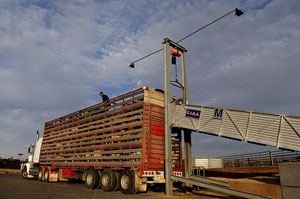Heavy Truck Driver
Tasks & duties

Heavy truck drivers may do some or all of the following:
-
carry out routine checks on their trucks every time they drive them
-
pick up the daily delivery instructions
-
make sure they understand the instructions and know the route
-
weigh the truck before and after it is loaded
-
supervise or help with the loading of the truck
-
check the condition of the load and that it is securely fastened
-
follow the correct safety procedures if the goods being transported are dangerous
-
handle livestock
-
check all the documentation related to the loads
-
drive a truck to make deliveries or pick up goods
-
keep a log book of the hours they work
-
carry out basic vehicle maintenance
-
run their own trucking business
Specialisations
Heavy truck drivers may specialise in a particular area of truck driving such as line haulage (city to city driving), rural driving, or driving trucks within a town or city centre.
Skills & knowledge

Heavy truck drivers need to have:
-
excellent heavy truck driving skills
-
knowledge of emergency procedures and how to identify and handle hazardous road conditions
-
first aid skills
-
knowledge of different methods of securing and covering loads such as tying different kinds of knots and using chains, locks and straps
-
an understanding of the Road Code, defensive driving techniques and relevant transport laws
-
knowledge of the area they work in and the correct routes to take
-
the ability to use satellite tracking equipment and on-board computers
-
skill reading maps
-
decision-making skills
Heavy truck drivers who are self-employed also need to have good business skills.
Entry requirements
You can become a truck driver without formal qualifications. You will probably get some informal training on the job, but you will need to obtain one or more heavy vehicle licences before working as a truck driver. Applicants will need to undertake a practical and written test.
You can also become a truck driver through a traineeship in Transport and Logistics (Road Transport). Entry requirements may vary, but employers generally require Year 10.
Secondary education
There are no specific secondary education requirements, but useful subjects include year 10 equivalent maths and English.
Tertiary education
Training on the job
New drivers often accompany more experienced drivers until they learn the travel routes, and learn how to handle the various goods being carried.
Useful experience
The best experience for this job is work as a truck driver's assistant. Other useful experience includes driving other heavy vehicles, or working on the docks, in warehouses or stores, or as a courier.
Related courses
Automotive Vehicle Operations
For more information, please refer to myfuture.
Document Actions
